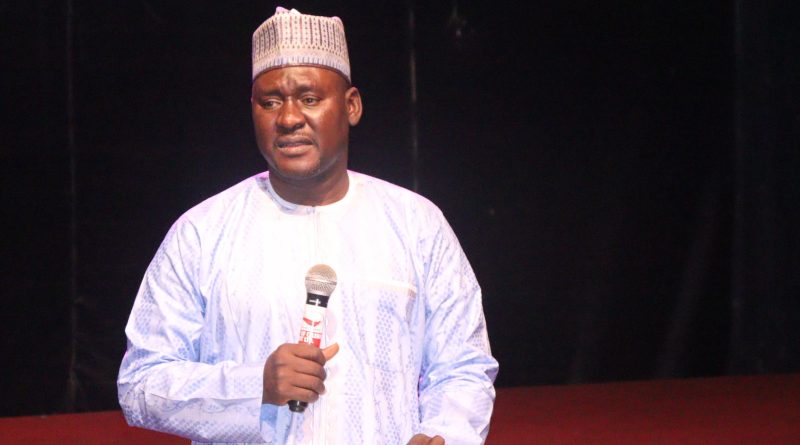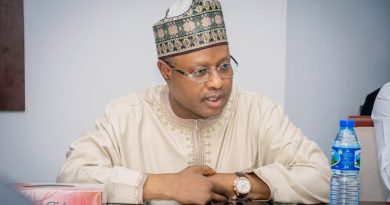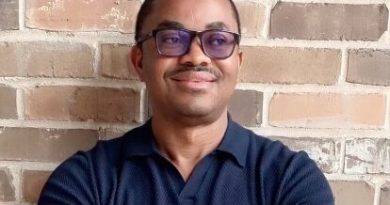Why Nigerians need explanation on proceeds of subsidy removal – Rafsanjani
Auwal Musa Rafsanjani is a Nigerian civil rights activist and the Executive Director of the Civil Society Legislative Advocacy Centre (CISLAC). On the sidelines of the IMF/World Bank meetings in Washington, he spoke to PREMIUM TIMES’ Business Editor, Oladeinde Olawoyin, and other journalists about the need for transparency in the management of the proceeds of subsidy removal in Nigeria, tax reforms, and contribution of civic actors at the IMF/World Bank meetings.
Question: At the World Bank/IMF meetings, there have been discussions on policies affecting various countries of the world. In the case of Nigeria, what can you say is the take-home from here?
Rafsanjani: So, there are a number of issues raised here at the IMF World Bank Spring meetings that affect especially countries like Nigeria, which is battling with the challenges of economic policies and their implementation.
And based on the conversations that are going on, there are global challenges. There are some challenges happening not only to African countries but also globally. And therefore, there is a need to have a deeper reflection on the kind of policies and programmes that countries like Nigeria are implementing in order to ameliorate the suffering that the people are going through and also boost the economy, because currently the policies that we have now require serious adjustment and we need to create serious reform that can help inject the economy; make the economy better and also improve the living condition of the people. This can be possible if you have committed leaders that will have a deeper reflection and come up with the policies and programmes that can help enhance our economy.
Question: What, specifically, are the major issues?
Productivity is one of the major issues. Our economy is almost very dependent on one sector, which is oil and gas, and even that one is not being harnessed in the manner that can actually be very useful. Given the audit report that comes out from EITI, it shows that a lot of oil companies are not even paying the revenue that they are supposed to pay to the Nigerian government.
At the same time, the Nigerian government has also not minimised wasteful spending, reckless borrowing, and also have not been able to deal decisively with inflation, issues of excessive borrowing, issues of lack of prioritisation in financing for development. But more importantly, the Nigerian government has not drastically dealt with issues of corruption and illicit financial flow is a major challenge that is going on in Nigeria.
With all these challenges and with the poor support to medium-scale businesses, it will be difficult to even deal with the poverty that the country is facing, which I believe is just an artificial poverty. If you block the leakages and enhance productivity and improve industrialization policies and programmes, I think we should be able to come out of the economic quagmire we have found ourselves in. These are the conversations going on.
Question: What’s the place of civil society in this whole conversation?
Rafsanjani: For us in civil society, part of our discussion with the IMF World Bank leaders is, we first even need to have a reform in the IMF World Bank operation. Nigeria and Africans, they don’t actually have much stake in the IMF World Bank framework, and there’s no way we will continue in this master-servant relation. Secondly, civil society has also talked about the fact that there’s a need to have a proper anti-corruption framework in the IMF World Bank operation and programming.

Countries cannot just be coming to borrow money, and there’s no measurement of what those money that have been borrowed for (if they) are not impacting positively on the people’s life, and you keep on piling these loans and debts. You recall we signaled a warning that subsidy withdrawal was going to impact people, even though we supported the fact that we need to deal with the corruption in subsidy. There’s no way you cannot or you will deprive citizens from having a relief or subsidy, because even here in the United States, you have subsidies in agriculture, you have subsidies in education, you have subsidies in the healthcare system, you have subsidies in the transportation system.
Why can’t you also have a subsidy that can ameliorate the suffering of Nigerians? So, the problem is not about the subsidy. The problem is corruption in subsidies. For example, Nigeria had made tremendous trillion savings on this fuel subsidy. Till today, there’s no explanation or statistic on what those subsidies have been used to better the lives of Nigerians in terms of healthcare system, in terms of education, in terms of even security, in terms of… generally the welfare and infrastructure of the Nigerian people.
Question: Any thoughts on asset recovery?
Rafsanjani: Nigeria has made tremendous recovery from looters on asset recovery. Civil society has been at the forefront of supporting the Nigerian government to claim those assets stolen and kept abroad.
CISLAC played an important role in working with the France Parliament to repatriate money back to Nigeria. The same thing also, CISLAC had been playing advocacy role to the United States government, to the British government, and all that. And yet when this money is returned, hardly could you actually figure what exactly those money have been used to do. No proper explanation, no proper accountability on what those recoveries, especially recoveries also from… domestic recovery. You cannot have all these and you expect the economy to be moving. You cannot continue to allow oil theft in Nigeria and you expect the economy to be moving in the manner that it’s supposed to be.
You remember at a point we are not able to even meet the oil quota allocated to Nigeria on the oil that we are supposed to be producing. And it is very clear that the corruption in the oil sector will continue to undermine the economic viability in Nigeria.
Question: The Nigerian delegation held an investors’ forum. What are your observations on the government’s efforts to improve Foreign Direct Investment by courting investors?
Rafsanjani: The third dimension which we have seen in this meeting is that for any foreign direct investment to happen, the country must get it right. You must have policy frameworks that will make people come and invest. As it is now, the ease of doing business in Nigeria is far away from being put to practice because companies are still experiencing extortion. Corruption is on the high level.
So, genuine investors are not able to come because they are not sure of how their investment can be protected. And linked to that is judicial corruption, because if the Nigerian judiciary is seen to be corrupt, no investor is going to come and invest in Nigeria because when you have arbitration, you will not be able to get justice, presumably. So corruption has done incredible damage to the drive of Nigeria for foreign direct investment because investors are not sure that their investment can be protected in the event that there is any dispute. So judicial corruption is a very dangerous thing to the economic survival of Nigeria.
Question: What are your thoughts on sustainability of subnational governments?
Rafsanjani: In Nigeria, many states are parasites. They are not able to harness the resources that are in their various states. Many state governors just depend on the monthly allocation that they collect from the federal government without investing in their state to harness resources that they can actually galvanize to put for development. So, if we are to get it right, it is not just about the federal government coming up with the policies, monetary policy issue, but also we need to get the states to be proactive, to be active, to be more innovative in terms of revenue generation and good utilisation of the same.
Question: Taxation and tax reforms are part of the ongoing conversation in Nigeria. Are there insights from the meetings?
Rafsanjani: Tax is good, but you cannot be “overtaxing” the poor while the multinationals are not given what they are supposed to be given. So, the current conversation is around global taxation and even national tax issue reforms. Yes, we support tax reform, but we don’t support taxation that will continue to undermine small businesses, and even women, because so many women are facing double taxation.
READ ALSO: EFCC re-arraigns former PDP chairman’s son for alleged N2. 2bn oil subsidy fraud
There must be a reform. Currently, many agencies of government are collecting taxes, so it is important that the reform looks at how we can unify and centralise taxes that various agencies are collecting. You cannot turn yourself to just a revenue generation agency and no accountability in that.
The other issue that we are also discussing, which is the fifth issue, is financing for development. There’s a global conversation going on. As you know, there is a conference that is going to happen in Paris about financing for development. Sadly, Nigeria has not been discussing as a global leader, on how (best) we can place our interest. The Nigerian government needs to wake up to begin to organise regional conversation and discussions around the issues of financing for development, because for us to achieve sustainable development goal, SDG, we need to prioritise and discuss financing for development. We cannot be financing unproductive activity with borrowed money. Even if it is not a borrowed money, you cannot be financing waste, duplication, and things that have no meaning to the lives of Nigerian people.
So, on this financing for development, CISLAC is working together with other countries in Africa to hold free consultation meetings to discuss and prioritise and recommend suggestions to the global conference that is coming sometimes in the year. Because if the government fails to do that, we as civil society, we need to encourage the government to articulate its position on that. And that’s what CISLAC along with other organizations are working toward by bringing in this consultation with a view to come up with recommendations and framework for financing for development.
We need it in Africa, we need it in Nigeria. These are the key issues that we have reflected on at the Spring meeting here in Washington, D.C.
Support PREMIUM TIMES’ journalism of integrity and credibility
At Premium Times, we firmly believe in the importance of high-quality journalism. Recognizing that not everyone can afford costly news subscriptions, we are dedicated to delivering meticulously researched, fact-checked news that remains freely accessible to all.
Whether you turn to Premium Times for daily updates, in-depth investigations into pressing national issues, or entertaining trending stories, we value your readership.
It’s essential to acknowledge that news production incurs expenses, and we take pride in never placing our stories behind a prohibitive paywall.
Would you consider supporting us with a modest contribution on a monthly basis to help maintain our commitment to free, accessible news?
Make Contribution
TEXT AD: Call Willie – +2348098788999







